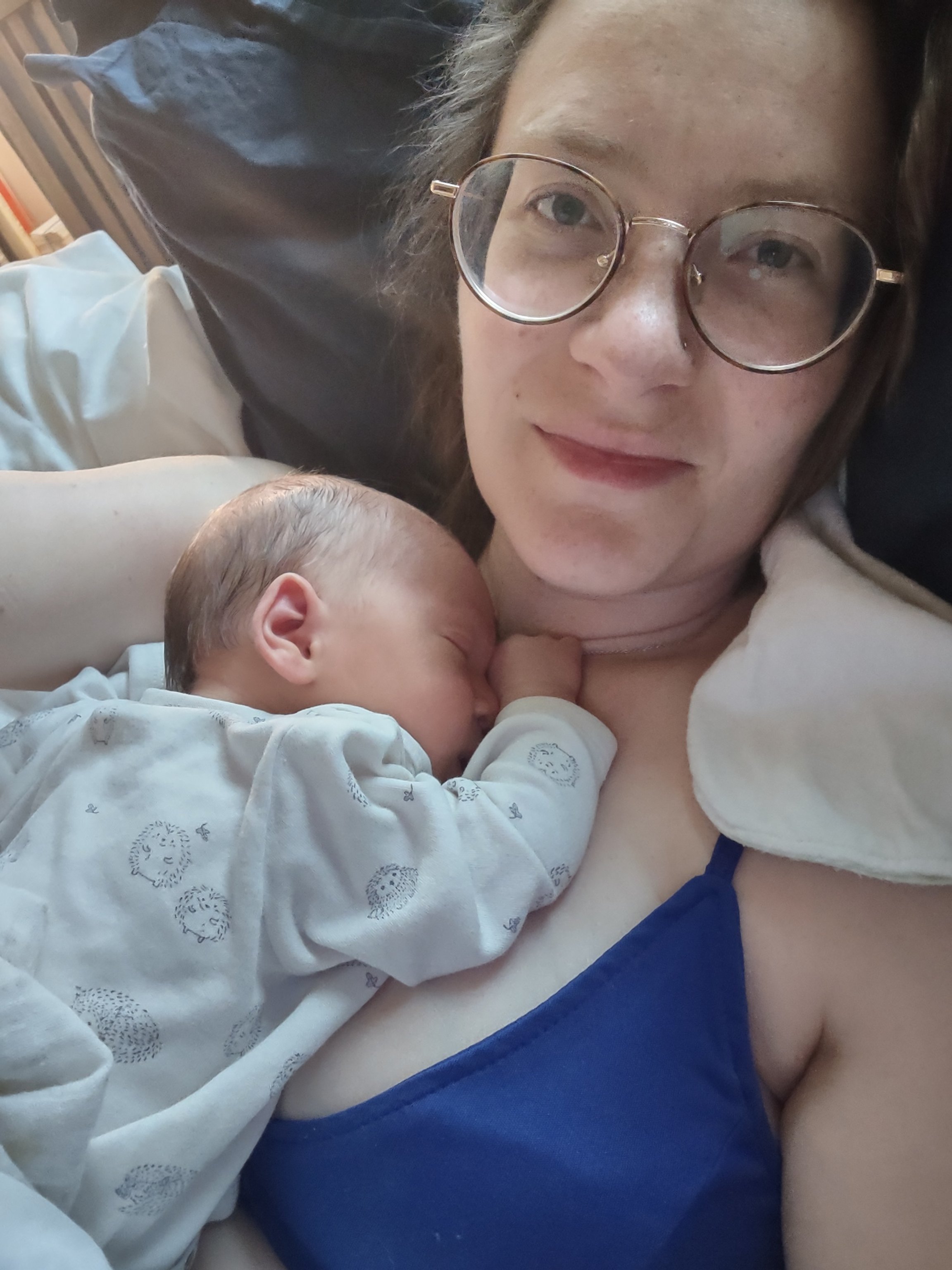Postpartum Care
How to care for your mental state after giving birth
You know that “David After Dentist” video? (If you don’t, you really do need to watch it - Youtube). Watching David ask in shocked disbelief, “Is it going to be like this forever?” is innocently funny because we all know that in his case, no, it will not be like this forever.
Yet, if you’ve given birth, this question is likely one that you’ve quietly asked yourself, not just once, but many times. And in your case, it’s not just innocent wonderings after laughing gas at the dentist, but a bone deep, self-altering, maybe even slightly panicked, questioning.
You look at your body, your mind, your house, your relationships, your sense of self, and ask, “Is it going to be like this forever?”
The answer to this question is complex, nuanced and individual.
For some people, in some ways the answer is no.
No, you won’t always be this tired (though you will be very tired for a very long time). No, you won’t always feel this disconnected from your body. No, your mind won’t always seem like it’s been turned to mush.
For some people, in some ways the answer will be yes.
Yes, your body now has a new shape and texture. Yes, how you view yourself will be different from now on. Yes, your house will now always be dirty to some extent. Yes, you will regain independent thought and purpose from your child.
No two postpartum experiences are the same, even for the same person after two different births.
And let’s be completely honest. Much of the stunned disbelief of asking yourself, “Is it going to be like this forever?” comes from the real gut punch and face slap that is postpartum.
If you’ve been through postpartum before, you likely uttered the question, “Why didn’t anyone tell me?!” about any number of things. Feeling truly betrayed that no one, not your mother, not your aunt, not your friend’s older sister, not your neighbor, not even your OBGYN/midwife (for goodness sake) told you what a shit storm postpartum can be.
There’s:
Healing from birth - soreness, tearing, stitches, c-section recovery
Navigating birth trauma
Sleep deprivation
Hair loss
Hair changes - texture, tone, thickness
Body changes - weight differences, feet swelling, hip widening
Pancake ass
Chapped or bleeding nipples
Engorgement
Clogged ducts
Mastitis
Sleep deprivation
Pelvic floor recovery
Leaking pee
Hemorrhoids
Painful urination or bowel movements
Hormone waves
Mental health challenges - postpartum anxiety, depression, psychosis
Changed relationships - romantic, familial or fraternal
Not feeling immediate love or bonding with your child
Consuming enough/proper nutrients
Feeling ‘over touched’
Never being able to be alone
Sleep deprivation (did we mention that?)
Now, let’s also be honest with ourselves. Even the postpartum things you did hear about beforehand, did you really get the message? Did the full gravity of what you were about to embark on get through to you?
Probably not.
There are some things you can’t fully comprehend unless you live through them. Postpartum is most definitely one of those things. Yet, postpartum can also bring a shifting and awakening as well.
There’s:
Deep love for this little human
Emboldened feminine power
Profound pride and satisfaction
Rich connection to the human experience
Blossoming of parental purpose
Heightened sense of self
Shear joy
Not being pregnant anymore (hurrah!)
Having fewer stipulations around food/drink
Fewer trips to the bathroom
It’s not all good or all bad. Yet, when you set expectations that are either all good or all bad you can paint yourself into a corner.
A corner of disappointment. A corner of failure for not ‘doing it right.’ A corner of shame, regret or guilt. A corner of limited options. A corner of only allowing yourself one way to feel.
Postpartum Care
Instead, we suggest the following strategies for mentally approaching postpartum and postpartum care. In case you’re new here, first, welcome, and second, our jam is teaching mental tools to bring empowerment and mental strength out in people no matter where they are in their birthing journey. You can check out our mission statement and bios here.
Back to the strategy for mentally approaching postpartum -
One - Learn about it beforehand.
Get your hands on as much information as possible. This is not one of those situations where ignorance is bliss. No, no, no. Ask those in your inner circle about the good, the bad and the ugly of their postpartum experiences. This doesn’t mean your experience will be the same, but it can give you a better heads up on some of the possibilities. Knowing what you’re about to get into won’t erase the challenge. That ain’t gonna happen, but you won’t get blindsided by it either. Knowledge is power!
Check out The Fourth Trimester by Kimberly Ann Johnson and Nurture by Erica Chidi Cohen.
Two- Approach it with curiosity.
Once you’ve done some investigating, turn over the information with a sense of curiosity. There is evolutionary rhyme and reason for the things that happen in the postpartum period. For example, our babies insite such love and joy, so that we’ll still drag ourselves out of bed four times a night to feed them. Granted, our current societal structures and pressures do NOT honor the postpartum journey and, in fact, make it way worse by throwing out unrealistic standards like having the perfect birth, getting your body back, taking care of everyone else while sacrificing yourself, or rushing back to work. But I digress…
Curiosity. Yes, when we approach the unknown of postpartum with a sense of curiosity that can take the place of fear or negativity. This goes for second and third time births too, because each trip through is its own unique experience. Think about the give and the take that your body is going to go through and consider what it will be like for you.
Three- Consider both the challenges and rewards.
As previously mentioned, there is no all good or all bad when it comes to postpartum. When you refrain from rigid expectations about what postpartum absolutely will be, you free yourself to allow it to be what it is. There is no need to be in contention with postpartum, and really that’s extremely counterproductive.
You won’t win a fight against the tide, you’ll just exhaust yourself even more. Allowing space in your mind, body and soul for a complex, mixed bag experience can actually improve your perception of it. A common refrain about difficult training processes within the military is to, “Embrace the suck.” Here’s how we’ll put it, “Embrace it all.”
Four - Refrain from judgment.
Finally, and critically, it is vital that you maintain a sense of nonjudgment during your postpartum experience. We are often extremely tough critics of ourselves. Doing this in the throes of our postpartum experience will throw fuel on the “negative fire.” If we’re constantly doing this, it can consume us.
And honestly, would you judge someone else for having a hard time navigating those lists above of the negatives and the positives, especially if they’ve never done it before? No! You’d be in awe that they’re still standing. So, go ahead, be in awe of yourself too and progress towards muting that inner critic.
Now, even doing all of this prep work doesn’t mean there won’t still be moments where you feel like you’re going to lose your shit. Remember David? Is it going to be like this forever?!
We’ve got some strategies to help with that too. When you are in the thick of postpartum recovery, consider -
Having an affirmation. If you’re into words, this could be a good strategy for you. Repeating a meaningful phrase in specific moments can help direct your energy, attention and motivation to a productive place. It can also aid in blocking out other, less helpful thoughts. Examples include, This is temporary. It won’t be like this for long. I am capable. I’m a tough mother.
Using calming strategies. The postpartum period is emotional. There will very likely be tears. If those emotions are sending you to not a good place, it can be extremely helpful to have go-to strategies for preventing a full mudslide. Deep breathing is our favorite because it’s quick, easy and can be done anywhere. Leaving the room or the house is another top option. There can be limited opportunities to be alone during the postpartum. This can get to be overwhelming. A change of environment can be helpful to calm down and reset. Taking a routine bath or shower with a moisturizing and/or self massage routine, candles and a soothing drink is both calming and great for recovery. If there are strategies you’ve successfully used in the past, call ‘em up. If it ain’t broke, don’t fix it.
Talking it out. Express your thoughts, feelings, and emotions. Acknowledge them and then release them. Turn to family and friends to share how you’re feeling. Ensure that those you turn to can provide you a safe, supportive space. Sometimes this may be just a total bitch fest while others it may be a deep cathartic release. Either way, there can be a real detriment to bottling things up. Just let it go, don’t hold it back anymore. Disney really does understand the human experience! You will likely also find that you aren’t alone in your questions, frustrations, struggles and delights. Feeling like people “get it” is normalizing and can open the door for better self-acceptance.
ACCEPTING HELP. Most importantly, ask for and accept help. This is NOT the time for rugged American individualism. Uh huh, no way. People truly want to help and you, no matter who you are, truly do need help. Accept it gratefully and without keeping score of who you now owe a favor. Food is honestly the BEST form of help. You have a lot of nutritional needs postpartum, yet it feels like the very last thing you want to do. Meal Train is a great option for this. Other forms of help include: cleaning, laundry, running errands, caring for siblings, holding the baby so you can take a shower, go for a walk, or take a nap. Prepare and post a list of helpful things people can do on your fridge, so when they show up and ask, “How can I help?” you can simply point them to the list.
Postpartum Mental Health
Let’s pause here for a moment. These recommendations are very helpful (if we do say so ourselves) for individuals who need a moderate level of coping strategies. However, there are instances where professional mental health support is required.
Postpartum depression - The March of Dimes describes it like this, “Postpartum depression (also called PPD) is a medical condition that many women get after having a baby. It’s strong feelings of sadness, anxiety (worry) and tiredness that last for a long time after giving birth. These feelings can make it hard for you to take care of yourself and your baby. PPD can happen any time after childbirth. It often starts within 1 to 3 weeks of having a baby. It needs treatment to get better.”
Postpartum anxiety - Information from Harvard Medical School says, “Some women experience panic attacks or symptoms of obsessive-compulsive disorder (OCD) in the postpartum period. Panic attacks are distinct episodes of intense anxiety accompanied by physical symptoms including a rapidly beating heart, feelings of doom, shortness of breath, and dizziness. Obsessions are intrusive, unwanted thoughts and may be accompanied by compulsions, or purposeful behaviors to relieve distress. These symptoms may be frightening to a new mother, especially when these thoughts involve harming the baby. Fortunately, when obsessions are due to an anxiety disorder, mothers are extremely unlikely to harm their babies.”
Postpartum psychosis - According to the National Institute of Mental Health, “Postpartum psychosis (PP) is a severe mental illness that occurs after childbirth. PP is a medical emergency, and it is important to seek help immediately by calling 911 or going to the nearest emergency room. Women who have PP can have delusions (thoughts or beliefs that are not true), hallucinations (seeing, hearing, or smelling things that are not there), mania (a high, elated mood that often seems out of touch with reality), paranoia, and confusion. Women who have PP also may be at risk for harming themselves or their child and should receive help as soon as possible. Recovery is possible with professional help.”
In such cases, we 100% recommend seeking out care from a mental health practitioner, ideally one who specializes in perinatal and postpartum care. Some support resources include:
Postpartum Timeline
You may have noticed that there has been no mention of a timeline when it comes to going through postpartum. Like, at six weeks you’re cleared for exercise and sex and then… Well, honestly in traditional healthcare settings that’s likely all the information on timing you’re likely to get. Six weeks after giving birth your care is basically done. You’re good to go! Right?! Oh hell no.
There is so much care and concern for the mother or birthing person while they are pregnant and for some reason that care and concern drops off a sheer cliff six weeks after the baby has arrived. This is one of the greatest tragedies of our healthcare system, but that rant is for another post.
The real answer is, there is no timeline when it comes to postpartum.
Some are feeling somewhat normal by six to ten weeks out, others seem to break through the toughest parts around six months post, and still others are dealing with aspects of postpartum recovery for years. The other aspect of this is the reality that there truly isn’t any “going back.” Some say postpartum is forever. That doesn’t mean you’ll be losing your hair at an alarming rate forever, but it does mean that aspects of you, your body and your relationships will be changed moving forward. Some of these changes will be for the better, but some others may not be to your liking. If or when you’re going through a tough patch with this new reality, see recommendations above.
Ultimately, your postpartum journey won’t be easy and you should not do it alone, but you do have the necessary inner strength to weather it. Seriously though, lots of people have multiple kids, so despite the challenges it is worth it! And in the end, it really won’t be like this forever.








